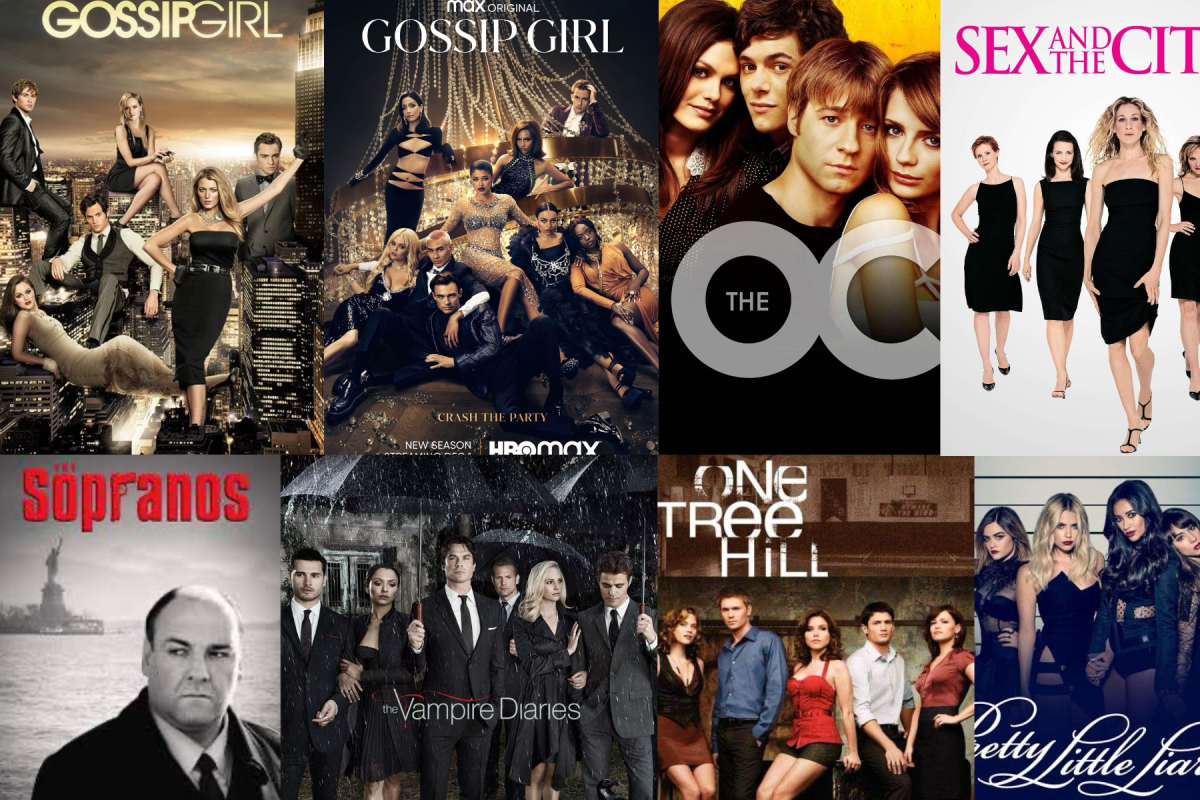The 2000s didn’t just gift us Razor Scooters, Lip Smackers, Heelys, and Scooby-Doo gummies—they also delivered TV shows that are the real MVPs of entertainment, making today’s content look as boring as sitting in traffic on a holiday weekend.
When someone asks you what your favorite show is, your answer will usually be a show released in the early 2000s: Pretty Little Liars, Gossip Girl, The OC, or One Tree Hill. These teen dramas and the many others released around the same time were the last of their kind. Shows from the early 2000s were comedic, unhinged, and exactly what viewers miss in television.
The early 2000s shows emerged before social media and the internet stormed the country. Although we were born into a world revolving around the internet, watching these shows brings a sense of nostalgia and innocence to our screens. The teens starring in the 2000s shows represent what an authentic high school experience should look like: big football games, fun cheerleading outfits, dumb drama, and getting into trouble. Comparatively, teen dramas now show teens wanting to be adults, dealing with real-life issues, and getting full-blown jobs. Whatever happened to kids just wanting to be kids?
In the realm of television, the 2000s are marked by an abundance of originality, a quality absent in recently made shows. Back then, shows like Gossip Girl featured memorable characters that teenagers could relate to. Now, show producers are on the hunt to develop original show ideas, but instead of following through and completing the hunt, they are remaking TV shows from the past.
Take Gossip Girl as an example. The show originally came out in 2007, but not long ago, in 2021, a reboot was made. This so-called “new and improved” Gossip Girl is not improved but instead felt like a chore when I watched it. In contrast to the original series, where characters lived blissfully in their perfect worlds inside a Manhattan bubble, the reboot fails to capture this allure. Instead of focusing on the teen drama that defined the original, the reboot includes themes such as the LGBTQ community and the Black Lives Matter movement. While commendable in its representation, these focal points seem to overshadow the essence of Gossip Girl, potentially making them better suited for an entirely new show.
“There’s a lot of queer content on this show,” said the reboot creator Joshua Safran during an interview at Vulture festival. “It is very much dealing with the way the world looks now, where wealth and privilege come from and how you handle that.” Although he does make a great point, the departure from the original plot line steers original Gossip Girl viewers away from watching the new Gossip Girl. Gossip Girl is a show that teenagers wish they were a part of, as the characters live in a carefree world. However, the reboot disrupts this fantasy with an unnecessary and unexpected political turn.
In the golden era of the 2000s, television thrived on originality and creativity. Fast forward to today, and shows are caught up in a loop of repetition and lackluster remakes. Take, for instance, Outer Banks. Remember the thrill of watching the first season. It was so fresh and exciting, following the Pogues on their quest to uncover the truth about John B’s father and legendary treasure. It was a storyline that got viewers hooked. The second season seemed to follow the same pattern, with the Pogues again finding themselves in a high-stakes chase, this time to save Sarah and get the cross. By the third season, it felt like simply watching a repeat of the first, with the Pogues now living in their own paradise, Poguelandia. The originality that made the first season so captivating was lost in the repetitive plotlines. It seemed like the creators were more focused on capitalizing on the show’s initial success rather than taking more time to make a compelling, unique storyline, which disappointed viewers.
When someone or something is politically correct, they avoid forms of expression or action that would target and insult a specific group. In today’s world, TV shows are trying to be as politically correct as possible, trying their best not to offend one’s beliefs, religion, or personality. Previously, shows could dance around race, religion, ethnicity, and personality through jokes. But now, producers are so scared of cancel culture that these inappropriate yet funny jokes are almost entirely abolished. In Ginny and Georgia, for example, a white male teacher treats Ginny, the mixed 16-year-old main character, with disrespect and racism. This scene was unnecessary for the show and the rest of the plot, creating aggravation and controversy with the viewers.
Congrats! You’ve arrived at your destination: shows from the early 2000s now playing. You got through the laborious traffic of the current TV and have made your way to the trip back down memory lane. So, take a few hours over the break and binge your faves from the good ol’ days.
















































































































































